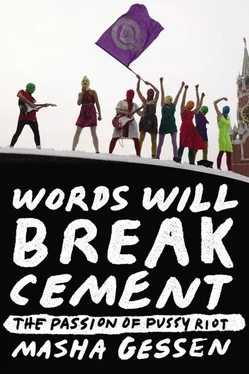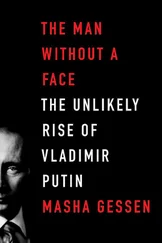Activist Ambition decided she was going to wait for Nadya to get out of prison. She knew that once she did, Nadya would start something—and Activist Ambition would feel that feeling again. She read all she could about Nadya to try to get a glimpse of what she might do next. Sometimes she even thought she could tell what it would be.
———
Kat was living back at the apartment with her father. For the first few weeks, maybe two months, she was a celebrity. She went to parties thrown by foreign journalists; she was recognized on public transport; people asked to have their pictures taken with her. She obliged—Kat usually did what people asked, if she could—but she was not sure she liked it. And they all wanted to know what she was going to do—what Pussy Riot was going to do. As though they did not realize that a suspended sentence meant she was on parole, and her sentence could be un-suspended at any moment.
Lest she forget, once a month she had to report to an office on the first floor of one of the yellow apartment towers not far from her home. It smelled of stale sweat, a faint reminder of the stench of the pretrial detention facility. She waited in a narrow corridor with her fellow paroled felons, then entered a small office where a squat policewoman shoved a piece of paper across a desk without looking and told her to sign it, using the condescending, familiar form of the imperative. The piece of paper certified that the officer had conducted an educational talk with Kat. She signed and got another piece of paper, instructing her to report back in another month.
Once, the police summoned her for questioning in the case of the cutting down of an Orthodox cross at a chapel outside of Moscow. It had been said that Pussy Riot might be responsible. Kat was questioned, said she had nothing to do with it, and was released.
If she could not be Pussy Riot in any visible, familiar way, Kat could at least get justice for Pussy Riot. If she could only prove that they had been denied proper legal representation, then the sentence could be overturned. To do that, she would have to expose the defense attorneys as the traitors they were. Irina Khrunova, the lawyer who had secured her release, slowly backed away from Kat’s case. “I can’t really claim that a thirty-year-old woman with a master’s degree did not understand the proceedings,” she told Kat, whose claim by that point more or less amounted to this. They agreed they would tell the larger world that Khrunova was too busy to handle Kat’s complaints. Kat found a lawyer on the Internet. She was doing most of the work herself by now, helped by a self-styled and self-taught legal expert, but she needed someone with a defense attorney’s license to sign her complaints. The new lawyer would meet her outside his apartment building in a suburb clear on the other end of Moscow and sign the papers she brought, using the trunk of a parked car as his desk. Then Kat would deliver the papers to the court—the guards at Khamovnichesky recognized her from when she’d been on trial there, and were nice to her—or to the Defense Attorneys Collegium, the rough equivalent of a bar association, where she also filed complaints. The collegium reviewed her long list and found only one clear violation of legal procedure among the many she had attempted to document: Violetta Volkova had failed to enter into a proper remunerative contract with her client, an offense under Russian regulations, which banned pro bono representation.
Kat still thought of herself as Pussy Riot, as did three other women who spent time with her. They were the two participants in the cathedral action who had not gone into hiding and had not gotten caught, and Natasha, Kat’s Rodchenko classmate and collaborator, who had participated in Voina but had not been living in Moscow during Pussy Riot’s brief period of activity before the arrests. They were quick to condemn as fake a tightly produced video that appeared in the summer of 2013, in which women in brightly colored dresses and tights and balaclavas belted lyrics—at least partly written by Nadya—that took aim at the unholy alliance between Putin and the oil industry. Among other things, Kat’s group felt that it did not correspond to Pussy Riot’s idea of serial performance: it consisted of several performances, but these, Kat’s group believed, had been staged solely for the purpose of producing the video rather than as independent actions. It was a subtle distinction, and a difficult argument to make given the group’s brief but varied history, but for Kat’s Pussy Riot, it was serious.
———
Arguably, serial performance—a months-long joint serial performance, unrehearsed and largely unscripted—was exactly what Nadya and Maria were engaged in. Their venues were the courtrooms of Berezniki and Perm in the Urals, Zubova Polyana and Saransk in Mordovia, and Nizhny Novgorod, where Maria was eventually transferred. Although, as convicted felons and coconspirators, they were banned from communicating with each other, they located their roles, as they always had, through a series of public performative experiments. They found ways of doing exactly what they had, in effect, promised to do in their closing statements in the Moscow court in August 2012.
Nadya had then said that it was the regime that was on trial and had pledged to continue to “act and live politically” to fight Russia’s overarching problems: “the use of force and coercion to regulate social processes” and the “forced civic passivity of the majority of the population as well as the total domination of the executive branch over the legislative and judicial ones.” That and the “scandalously low level of political culture… intentionally maintained by the state system and its helpers.” And the “scandalous weakness of horizontal links in society” and the “manipulation of public opinion, carried out with ease because the state controls the vast majority of media outlets.”
Maria had chosen the opposite approach in her closing argument, moving from the general to the specific. Like Nadya, she had addressed the sham nature of the trial, but it was the particulars that engaged her. She had talked about the psychiatric facility for children—in part because her visits there, of all her experiences before jail, had prepared her best for life behind bars, but also because the similarities between its specific horror and the insanity of the court proceedings served to highlight the absolute absurdity of the trial. Nadya, on the other hand, pointed to the trial as a small example of the larger travesty—of justice, decency, and reason—that Pussy Riot had been screaming about.
And Kat had spoken only of the results of the trial and conclusions from it.
———
Almost as soon as Nadya and Maria arrived in their penal colonies and arranged for new legal representation, both began filing all the appeals, complaints, and motions they and their lawyers—but mostly Maria with her legal books—found grounds to file. Petya shuttled back and forth between the colonies, the inmates, and the lawyers, collecting paperwork and delivering messages. Most important, he coordinated the ragtag support group, fashioning it into a working entity that distributed information, served as bodies—tweeting, texting, and videotaping bodies—at every hearing, and ultimately helped ensure that all hearings were open to the public and covered by the media. In late January, less than three months after leaving pretrial detention in Moscow, the Pussy Riot inmates commenced a regular schedule of court hearings, which also guaranteed them regular appearances in Russian and international media.
If Pussy Riot ever edited their court performances into a clip, its refrain would be “It seems that the court is denying my right to a defense.” (Indeed, the same might be claimed by any defendant in any court in Russia.) After a few hearings, Maria worked out her MO. She confronted the court to the point where the violations, and their routine nature, were exposed, obvious even to the clerks and court marshals, who had long ago stopped paying attention. At this point, the judge usually lost composure, along with the seemingly inherent sense of his or her own superiority. Judges snapped at Maria, screamed at her, and sometimes became belligerent. As soon as that happened—and it happened every time—Maria, whose own voice, by this point in the proceedings, had begun to crack traitorously, instantly regained her calm. And then she said, “It seems that the court is denying my right to a defense.”
Читать дальше












